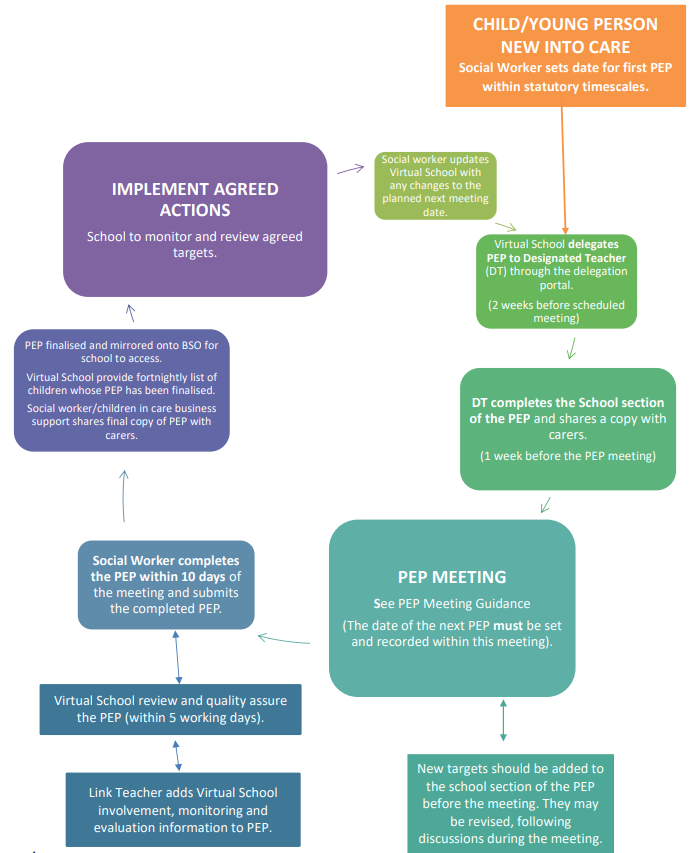Personal Education Plans (PEPs)
A Personal Education Plan (PEP) is a statutory and essential part of the Care Plan for every child in care. It provides a clear structure for planning, monitoring, and improving the educational experience of children looked after. The PEP ensures that every
child receives the stability, ambition, and personalised support they need to thrive.
A high‑quality PEP must:
- Provide an up‑to‑date picture of the child’s strengths, needs, progress, and any barriers to learning.
- Ensure high aspirations are set and reviewed regularly.
- Identify the support, interventions and resources needed to help the child fulfil their potential.
- Strengthen communication between school, social workers, carers, and the Virtual School.
- Place the child’s voice at the centre of planning and decision‑making.
- Track progress over time and support early identification of concerns.
A strong PEP acts as a roadmap, ensuring all professionals share a common plan for the child’s educational journey. These expectations are embedded throughout statutory guidance.
Statutory Framework
PEPs are required under:
Expectations for Personal Education Plans
A high‑quality PEP should:
- Set ambitious, aspirational goals.
- Promote access to a broad, balanced curriculum and enrichment offers.
- Support long‑term planning including transitions and future educational pathways.
- Be child‑centred, reflecting their views, wishes and feelings.
- Be evidence‑based, drawing on teacher assessment and progress data.
- Address academic progress, attendance, wellbeing, SEND needs, behaviour, and social development.
- Be clear, specific and collaborative, with contributions from all key adults.
Termly reviews should evaluate:
- Academic and wider progress
- Target achievement
- Emerging needs or barriers
- Pupil Premium Plus (PP+) spending and impact
In Bradford, the Virtual School quality‑assures every PEP to promote continuous improvement. Associated documentation can be found below:
SMART Targets
Every PEP must include SMART targets that are:
- Specific – What exactly will be achieved?
- Measurable – What evidence will show progress?
- Achievable – Realistic but stretching.
- Relevant – Linked to needs or aspirations.
- Time‑bound – Usually within the term.
Examples:
- “Improve reading age by 6 months through weekly 1:1 reading sessions and daily phonics practice.”
- “Improve attendance to 95% through pastoral support and structured morning routines.”
- “Develop emotional regulation using weekly sessions with a learning mentor and personalised strategies.”
SMART targets ensure actions are purposeful and progress can be demonstrated.
Initiating, Developing and Reviewing PEPs
Statutory guidance requires that social workers, supported by the VSH:
- Initiate a PEP even if the child has no school place.
- Ensure the PEP is initiated within 10 working days of entering care.
- Ensure the PEP includes up‑to‑date attainment and progress information.
- Ensure responsibilities, actions and timescales are clearly recorded.
Within school, the Designated Teacher leads on developing the PEP, ensuring it is used to monitor progress against educational targets.
The VSH provides quality assurance and ensures the PEP remains a living, evolving record that informs wider care planning.
Bradford PEP Process (2023–2026 Update)
Bradford implemented a revised PEP process and Delegation Portal in November 2023.
Key steps include:
- Delegation of the school section to the Designated Teacher two weeks before the meeting.
- DT completion of the school section, including attainment, teacher feedback, and child voice.
- PEP meeting, reviewing progress, setting SMART targets, and planning PP+ use.
- Finalisation by the social worker within 10 working days.
- Virtual School QA within 5 days.
- Publication on Bradford Schools Online for school access.
PEPs sit within the LCS social care system. Completed PEPs are accessible to schools via BSO.

Our Commitment as a Virtual School
We are committed to ensuring that every child in care has:
- A high‑quality, ambitious PEP that reflects their strengths and aspirations
- Access to the right support at the right time
- Skilled and knowledgeable adults who advocate for them and believe in their potential
- A clear, supported pathway to long‑term success
Key PEP Dates 2025-26
